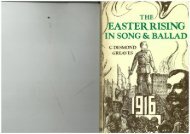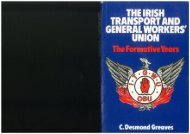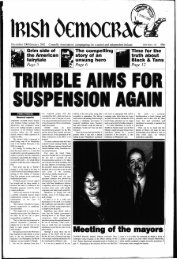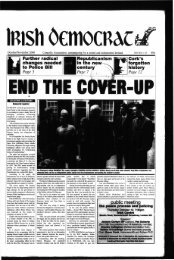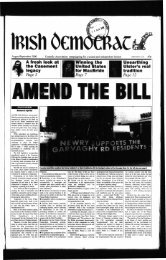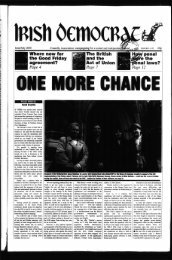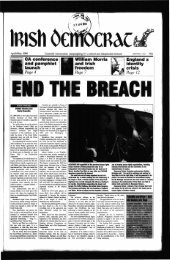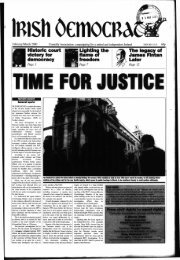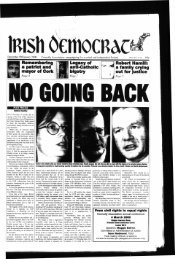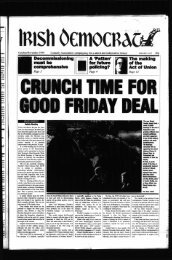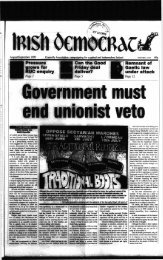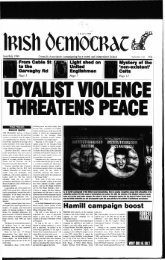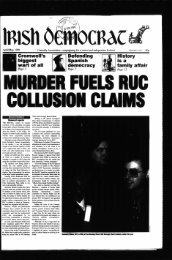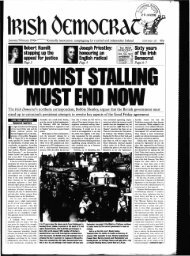Irish Democrat October - November 1996
You also want an ePaper? Increase the reach of your titles
YUMPU automatically turns print PDFs into web optimized ePapers that Google loves.
1 „,<br />
•<br />
•• I • I I I I I I I I I I I I I I I I • II Ill I I I I I l\ M I I I • ( H i II I I I I I I I M i l l<br />
\ r - '<br />
P3<br />
Reclaiming William Morris from<br />
the revisionists<br />
p 3 & 5<br />
Desmond Greaves Summer<br />
School reports<br />
p8<br />
illegal arms find at Buckingham<br />
Palace<br />
M I I I I I I I I I I I I I I I I I I I I I I I I I I I • l l l l l l l l l l l l I I I I I II I I • I I I I I I I I I I I I I I I I II I I I I I I<br />
<strong>Irish</strong> <strong>Democrat</strong><br />
<strong>October</strong>/<strong>November</strong> <strong>1996</strong> • Price 50p<br />
Connolly Association: campaigning for a united and independent Ireland<br />
Association<br />
to sue over<br />
'police<br />
vandalism'<br />
<strong>Irish</strong> prisoners<br />
Enda Finlay<br />
THE BRITISH<br />
government<br />
faces another<br />
humiliating<br />
legal crisis with<br />
the news that more than<br />
100 <strong>Irish</strong> prisoners may<br />
have been convicted on<br />
unreliable forensic evidence.<br />
Concern has been<br />
growing since it was revealed<br />
that the Home<br />
Secretary was reviewing<br />
the cases of 14 IRA<br />
prisoners referred by<br />
Professor Brian Caddy,<br />
who headed the inquiry o Unsafe convictions: British justice in the dock once more<br />
into Britain's main forensic<br />
explosives laboratory.<br />
It has since emerged the current Home Secretary<br />
will have to shows the complete con-<br />
"The latest revelation<br />
that a further 100 cases<br />
dating back to the early reconsider his initial reaction<br />
that "the chances shown by a regime that<br />
tempt for human rights<br />
1970s and 1980s could<br />
also be unreliable, thanks that there has been a miscarriage<br />
of justice are with securing convic-<br />
was more concerned<br />
to now discredited advice<br />
given by the very small".<br />
tions than making sure<br />
Forensic Science Service The news was greeted they had the right<br />
to the Home Office. with anger both-in Ireland<br />
and in Britain. Association president<br />
people," said Connolly<br />
The problem that such<br />
a huge review of cases<br />
would pose for the Home<br />
Office is obvious.<br />
It is also certain that<br />
David Granville.<br />
"The 'appalling vista'<br />
that Lord Denning tried<br />
to suppress is now openeing<br />
up before our<br />
eyes," said Mr Granville.<br />
"The Home Secretary<br />
must now act swiftly and<br />
decisively to release<br />
those prisoners wrongly<br />
convicted.<br />
"Conditions for many<br />
<strong>Irish</strong> prisoners in British<br />
jails actually worsened<br />
during the IRA ceasefire,<br />
underlining the British<br />
government's contempt<br />
justice and the <strong>Irish</strong><br />
peace process," Mr Granville<br />
said.<br />
THE CONNOLLY Association<br />
is to seek substantial<br />
compensation<br />
from Lothian and Borders<br />
police after a senior officer<br />
admitted that they had destroyed<br />
an historic banner<br />
made by the great-granddaughter<br />
of socialist labour<br />
leader James Connolly.<br />
The banner, which had<br />
never been seen in public,<br />
was confiscated by the Edinburgh<br />
police in June 1993<br />
during attempts to prevent a<br />
banned march organised to<br />
commemorate James Connolly<br />
in the city of his birth.<br />
A number of Association<br />
members, including London<br />
CA member Gerry Fennelly,<br />
were also detained at the<br />
time of the incident.<br />
The police have since<br />
claimed that they attempted<br />
to contact Mr Fennelly using<br />
the Metropolitan Police, but<br />
being unable to locate his<br />
current whereabouts in<br />
order to return the banner,<br />
had ordered its destruction.<br />
The admission by the Lothian<br />
and Borders Assistant<br />
Chief Constable, T Wood,<br />
followed lengthy correspondence<br />
between the Association<br />
and the police, who<br />
had previously refused to<br />
say what had happened to<br />
the banner or a number of<br />
badges which were also confiscated.<br />
Commenting on the this<br />
latest development, Connolly<br />
Association general<br />
secretary Enda Finlay accused<br />
the police of carrying<br />
out an act of 'gross and wanton<br />
vandalism'.<br />
"It is impossible to put a<br />
value on this banner and we<br />
will be seeking legal advice<br />
on how best to press our<br />
claim for compensation. It is<br />
utterly ridiculous for the<br />
police to say that they<br />
couldn't contact the owner<br />
given the fact that the Association's<br />
name was prominently<br />
displayed, and that<br />
members of die Edinburgh<br />
branch of the Association<br />
were well known to the<br />
police at that time."
IfiU<br />
I<br />
Rebuild the<br />
peace<br />
THl HNDof August <strong>1996</strong>could havebeen the celebration<br />
of the second anniversary of the IRA ceasefire.<br />
Instead, in the last number of weeks there has been<br />
speculation that a renewal of the 1994 ceasefire might be<br />
on the way, although when this is expected and what sort<br />
of ceasefire it will be, is not detailed. It would also be<br />
foolish to assume, as a result of the speculation, that a new<br />
IRA ceasefire is imminent.<br />
Unfortunately an opportunity has been lost and instead<br />
of addressing and discussing all the issues that the<br />
ceasefire seemed to allow space for — Orange marches,<br />
policing, discrimination, prisoners and so on — the last<br />
two years have been bogged down on the issue of decommissioning.<br />
The talks process has failed to get over this<br />
seemingly insurmountable hurdle.<br />
In fact recent months have thrown up scenes that many<br />
of us had hoped had been buried in the black and white<br />
news coverage of the 1970s. The sight of Catholics being<br />
intimidated out of their homes and loyalist roadblocks<br />
following Drumcree, shattered the confidence and hopes<br />
of a great many people, especially the SDLP-voting<br />
middle-class. The magnitude of the damage done by this<br />
summer's marching season can only be guessed at. In<br />
business termsalonea recentestimateputitat£10million.<br />
What price the social and political damage?<br />
One of the most obvious manifestations of the damage<br />
is the boycotting of businesses run by Orangemen that<br />
participated in Drumcree this year. Despite unionist protests<br />
insisting that, "this sectarian campaign was orchestrated<br />
by Sinn Fein and another instance of their ethnic<br />
cleansing of Protestants", a recent article in the <strong>Irish</strong> News<br />
has revealed that the boycott was actually started by the<br />
Royal Black Preceptory as a response to nationalists refusal<br />
to allow a march through Roslea in Fermanagh last<br />
year, before the current Orange boycott.<br />
There are also continuing concerns over the loyalist<br />
ceasefire, concerns which were obviously added to by the<br />
expulsion of Billy Wright, and the standing down of Mid-<br />
Ulster UVF with which he is identified. His championing<br />
by the accordion-playing-reverend, Willie McCrea was<br />
unpalatable as the reverend's renditions, as this was an<br />
individual who at the very least was supporting a return<br />
to killing Catholics by Loyalists. The INLA also continued<br />
to show everybody that they are still around and whilst<br />
observing a ceasefire of sorts, their current round of internecine<br />
violence has claimed many lives.<br />
But despite all these concerns and backtracking, and<br />
nobody should doubt that enormous damage has been<br />
done, there is still hope, albeit very slim, that the peace<br />
process can be rebuilt. There is speculation about a<br />
renewed IRA ceasefire, an <strong>Irish</strong>-American delegation recently<br />
visited Ireland as they did in the weeks preceding<br />
the initial ceasefire. The SDLP and the UUP are apparently<br />
reaching an agreement over the issue of decommissioning<br />
and the new head of the RUC Ronnie Flanagan has been<br />
making more moderate noises than his predecessor.<br />
Most importantly the more militant republicans have<br />
kept their powder dry in the Six Counties over this summer's<br />
marching season. There is still however little movement<br />
on the transfer of prisoners, the marching issue<br />
continues to provoke very angry scenes. A number of<br />
other issues including the use of plastic and rubber bullets<br />
have not yet been addressed. If the peace process is to be<br />
rebuilt it will need to move towards an active agenda of<br />
change at a much quicker pace than heretofore.<br />
The forthcoming Labour Party conference's main motions<br />
on Ireland will focus on the need to rebuild the peace<br />
process and the role of the Labour Party in that reconstruction.<br />
It is obvious that if the peace process is to be rebuilt,<br />
the Labour Party will have to come up with a better idea<br />
than bi-partisanship, which at best offered the illusion of<br />
being able to over-ride the unionist veto and at worst<br />
made the Labour Party as culpable as the Tories for the<br />
ending of the IRA ceasefire,<br />
o EF<br />
Mi DemocRAT<br />
BI-MONTHLY NEWSPAPER OF<br />
THE CONNOLLY ASSOCIATION<br />
Founded 1939. Volume 51, number 5<br />
Editorial board: Helen Bennett; Gerard Curran;<br />
David Granville (editor); Jonathan Hardy; Peter<br />
Mulligan; Alex Reid; Moya Frenz St Leger.<br />
Production: Derek Kotz<br />
PUBLISHED BY: Connolly Publications Ltd, 244<br />
Gray's Inn Road, London WC1X 8JR, telephone<br />
0171 833 3022. Email: Connolly@geo2.poptel.org.uk<br />
PRINTED BY: Ripley Printers (TU) Ltd, Nottingham<br />
Road, Ripley, Derbyshire, telephone 01773<br />
743 621.<br />
HEADLINES<br />
Greaves school success<br />
Summer school<br />
<strong>Democrat</strong> reporter<br />
THIS YEAR'S Desmond<br />
Greaves summer school,<br />
the eighth, continued to<br />
build on the event's growing<br />
reputation as an important<br />
forum for left-wing political<br />
debate in Ireland.<br />
Held in the pleasant surroundings<br />
of the <strong>Irish</strong> Labour<br />
History Museum in Dublin,<br />
the school remains at the forefront<br />
of moves to challenge the<br />
'anti-national' project at the<br />
heart of official and academic<br />
orthodoxy.<br />
The school's success owes<br />
much to its ability to attract<br />
high-calibre lecturers.<br />
This year they included the<br />
leading left-wing intellectual,<br />
Professor Terry Eagleton, who<br />
spoke on the ideology of <strong>Irish</strong><br />
studies.<br />
Other sessions were led by<br />
educationalists Frankie Watson<br />
and Peter Collins, who opened<br />
a lively discussion about<br />
the teaching of history in <strong>Irish</strong><br />
<strong>Irish</strong> President to unveil<br />
Wolfe Tone headstone<br />
can republicanism.<br />
Matilda Tone, who died in<br />
1849, and her family were important<br />
members of the pre-<br />
Famine New York <strong>Irish</strong><br />
community whose leaders included<br />
prominent United <strong>Irish</strong>men<br />
such as Thomas Addis<br />
Emmet, William James Mac-<br />
Neven, William Sampson,<br />
Thomas CConor, John Chambers<br />
and Samuel Neilson.<br />
Following the unveiling of<br />
BROOKLYN'S Greenwood<br />
cemetery is to be<br />
the site of the first American<br />
bicentennial commemoration<br />
of the United <strong>Irish</strong>men<br />
movement when <strong>Irish</strong> President<br />
Mary Robinson unveils<br />
the restored headstone of Theobald<br />
Wolfe Tone's widow,<br />
Matilda, at a public ceremony<br />
on <strong>October</strong> 8.<br />
President Robinson will be<br />
the guest of the <strong>Irish</strong>-American<br />
Labour Coalition and the New the headstone.<br />
York History Roundtable.<br />
Both organisations plan to<br />
mark the legacy of 1798 by recognising<br />
the United <strong>Irish</strong> expatriates<br />
who settled in New<br />
York, where they contributed<br />
to the development of Ameri-<br />
Professor<br />
Nancy Curtin of Fordham<br />
University will deliver an address<br />
on Matilda Tone's role in<br />
the dissemination of the ideals<br />
of the United <strong>Irish</strong> movement<br />
following the death of her husband.<br />
Councils face repair bills<br />
TWO LOCAL councils hit<br />
by IRA bombs since the<br />
end of the ceasefire are<br />
facing repair and clean-up bills<br />
of around £5 million as a result<br />
of uninsured damage to council<br />
property.<br />
Connolly Association update<br />
The London Borough of<br />
Tower Hamlets and Manchester<br />
City Council have been refused<br />
extra help from central<br />
government and are now facing<br />
bills of £2 million and £3<br />
million respectively.<br />
Sheffield:<br />
Where Now for Peace in Ireland?<br />
with Kevin McNamara MP, Kevin McCorry, Campaign for<br />
Democracy, and Enda Finlay, Connolly Association.<br />
<strong>October</strong> 17,7:30 pm at Morrissey's The Riverside public house,<br />
Mowbray Street.<br />
Liverpool:<br />
Desmond Greaves Memorial Lecture: Peter Berresford Ellis on<br />
the history of the Orange Order<br />
<strong>November</strong> 2,1.30 pm at the Institute of <strong>Irish</strong> Studies, University<br />
of Liverpool, 1 Abercromby Square.<br />
London:<br />
Connolly Association Annual Conference (open session)<br />
Invited Speakers: Kevin McNamara MP, Eamon O Cuiv TD<br />
<strong>November</strong> 9, 10:30am in the Kennedy Room, Camden <strong>Irish</strong><br />
Centre, NW1.<br />
schools throughout Ireland; Dr<br />
Christopher Woods, joint editor<br />
of die forthcoming threevolume<br />
Oxford edition of<br />
writings of Wolfe Tone, on the<br />
relationship between leading<br />
United <strong>Irish</strong>men Theobald<br />
Wolfe Tone and Thomas Russell;<br />
and Kevin McCorry of the<br />
Belfast-based Campaign for<br />
Democracy and Sean Farren of<br />
the SDLP on the Northern situation.<br />
o More school reports, page 5<br />
<strong>Irish</strong> population<br />
reaches new high<br />
Census<br />
<strong>Democrat</strong> reporter<br />
THE FIRST results of the<br />
19% Census show that the<br />
26-County population is<br />
now 3.6 million, die highest<br />
since the foundation of the<br />
state in 1921 and a rise of<br />
100,000 since the last census in<br />
1991.<br />
The increase has not crane<br />
about because <strong>Irish</strong> people are<br />
having more children. <strong>Irish</strong><br />
fertility and birth rates have<br />
been falling for two decades, as<br />
people have fewer children<br />
than their parents, in line with<br />
general trends in industrialised<br />
countries.<br />
More women work outside<br />
the home, social and sexual attitudes<br />
have changed. Most<br />
young <strong>Irish</strong> women nowadays<br />
will have just two children,<br />
which is what is needed to permit<br />
each generation to replace<br />
itself, without natural growth.<br />
The extra 100,000 are the result<br />
of a high level of net immigration,<br />
more people returning<br />
or moving to Ireland, in contrast<br />
to high levels of emigration<br />
from the country in the<br />
1980s and previous decades.<br />
Ehiblin's population continues<br />
to grow, as do those of<br />
other cities — Galway by<br />
enough to make it the fastest<br />
growing city in Europe. All but<br />
four counties show an increase,<br />
die losers being the border<br />
counties of Longford,<br />
Leitrim, Roscommon and<br />
Monaghan.<br />
If the 'peace process' progresses<br />
to real peace, these border<br />
counties may at last get<br />
their chance, for they have<br />
been hit by partition and its<br />
consequences for decades.<br />
Donations to the Connolly Association and the<br />
<strong>Irish</strong> <strong>Democrat</strong><br />
July 12-September 17<strong>1996</strong><br />
R Kelly £2.50; R Deacon £12.50; F Jennings £10; M Keane £40;<br />
C Cunningham £5; S Healy £8; I Mulazzani £62; S Redmond<br />
£5; A Knott £7; C C £20; J McC £17.50; J Hardy £5; L & E Dwyer<br />
£5; G Day £5; L Bradley (in memory of Bernard Bradley) £10;<br />
J & N Duggan £13; PT Mallin (in memory of C D Greaves)<br />
£25;<br />
V Deegan £5; M Keane £5; A Donaghy £5; P W Ladkin £5; A<br />
Harvey £4; T Cronin £10; C Bland (in memory of Paddy Bond)<br />
£20; J McC £10; A CKeefe £5; J O'Connor £2; M Parkinson<br />
£10; P Williams £10; D Smith £5; L Wilde £10; E Heath £2; J<br />
Kenneally £5; J Farrell £5; C Haswell £10; S Hare £5; J Egan £1<br />
Bankers' orders £335<br />
TOTAL ££721.50<br />
Guidelines aim to<br />
tackle sectarian<br />
harassment at work<br />
Civil rights<br />
<strong>Democrat</strong> reporter<br />
MORE THAN one in ten<br />
people working in the<br />
Six Counties has experienced<br />
sectarian harassment according<br />
to a recent survey on<br />
behalf of the Northern Ireland<br />
Fair Employment Commission<br />
(FEC).<br />
The figures, which revealed<br />
that nearly a quarter of all catholic<br />
men and ten per cent of<br />
protestant men had been harassed<br />
at work, were published<br />
to coincide with the launch<br />
of new guidelines for employers<br />
aimed at tackling the<br />
problem.<br />
The guidelines have won<br />
the endorsement of both the<br />
Confederation of British Industry<br />
in the Six Counties and<br />
the Northern Ireland Committee<br />
of the <strong>Irish</strong> Congress of<br />
Trade Unions.<br />
ICTU has its own anti-sectarian<br />
campaigning and educational<br />
organisation, Counteract.<br />
FEC chief executive Harry<br />
Goodman said at the guidelines'<br />
launch that the aim<br />
was to help employers create a<br />
safe and dignified working environment<br />
where potential victims<br />
could feel assured that<br />
problems would be dealt with<br />
seriously and sensitively.<br />
"Of all fair employment<br />
issues, sectarian harassment is<br />
one of the most sensitive and<br />
difficult to deal with, very<br />
often because it is a hidden,<br />
unreported problem," Goodman<br />
said.<br />
"But, reported or not, any<br />
behaviour that causes fear or<br />
apprehension to employees is<br />
totally unacceptable."<br />
Revisionists are at it everywhere, but<br />
here NICK WRIGHT rescues William<br />
Morris from the clutches of those who<br />
would deny the politics of this<br />
revolutionary and supporter of the cause<br />
of <strong>Irish</strong> freedom<br />
, i<br />
HEADLINES<br />
Trade unionist is victim of sectarian attack<br />
o The cost of representing the concerns of his members in<br />
the Ormeau Road bakery was very nearly life itself for former<br />
Transport and General shop steward Pearse McKenna, pictured<br />
above speaking at a workshop on sectarianism in the<br />
workplace in London recently.<br />
William Morris<br />
IN THE centenary of his<br />
death, the English craftsman,<br />
designer, political<br />
leader and poet, William<br />
Morris is claimed by temporising<br />
reformers as the precursor<br />
to Blairism!<br />
Not only Ireland's history<br />
must be rewritten if the demon<br />
of revolution is to be exorcised.<br />
For a man who wrote in his<br />
mature years: "I call myself a<br />
Communist and have no wish<br />
to qualify that word by joining<br />
any other to it," the revisionist<br />
makeover of Morris suppresses<br />
a revolutionary<br />
politics which encompassed,<br />
naturally, a practical engagement<br />
with the <strong>Irish</strong> question.<br />
In 1886 he wrote "... the<br />
<strong>Irish</strong> (as I have some reason to<br />
know) will not listen to anything<br />
except the hope of independence<br />
as long as they are<br />
governed by England; no, not<br />
even to the most elementary<br />
propositions about the land,<br />
which concerns them most and<br />
nearest — they can see nothing<br />
else than an Ireland freed from<br />
that government."<br />
Morris had in mind his reception<br />
by a Dublin audience<br />
of his lecture on the 'aims of<br />
art.'<br />
He reports "One slip I unwittingly<br />
made by mentioning<br />
Sackville Street, which is<br />
popularly know as OConnell<br />
Street, a name which the authorities<br />
refuse to accept.<br />
"A great to-do followed this<br />
blunder, which on a hint from<br />
the chairman, I corrected with<br />
all good will and was allowed<br />
to go on, with cheers." William<br />
Morris was republican by<br />
democratic instinct and developed<br />
ideology.<br />
His second trip to Ireland,<br />
in 1886, coincided with the<br />
Home Rule Bill and Gladstone's<br />
speech, brought home<br />
the divisive character of religious<br />
bigotry:<br />
"I cannot help thinking that<br />
when Home Rule is established<br />
the Catholic clergy will<br />
begin to act after their kind,<br />
and try after more and more<br />
power".<br />
HIS FIRST visit — an 1877<br />
journey taken to advise<br />
the Countess of Charleville<br />
at Tullamore, County Offal<br />
y, entirely for commercial<br />
purposes notwithstanding —<br />
had impressed upon him the<br />
poverty and degradation of<br />
rural life in landlord Ireland.<br />
Discussing the class character<br />
of the government — in the<br />
January 14, 1888 Commonweal<br />
— he points out: "As the English,<br />
Scotch and Welsh working<br />
men became educated into<br />
friendliness and sympathy<br />
with die <strong>Irish</strong> peasant, so the<br />
middle class became educated<br />
into hatred of him.<br />
"To them he is no longer<br />
now a romantic survival of<br />
past times of a rebellion made<br />
beautiful by distance, carrying<br />
about a preposterous sentiment<br />
of nationality never to be<br />
Less than two months after raising the issue of displays<br />
of banned sectarian emblems with management Mr<br />
McKenna, one of a small number of catholic workers at the<br />
bakery, was shot in the back at close range by a masked<br />
gunman.<br />
realised save as a flavour to a<br />
few old ballads sung to melancholy<br />
ancient tunes, he is a<br />
working man asking for some<br />
of the property of the proprietary<br />
classes, and not too nice as<br />
to the means by which to establish<br />
his claim."<br />
What is remarkable about<br />
this passage is not simply its<br />
internationalism and working<br />
class politics but his clear<br />
sighted embrace of the modern<br />
world, of conflict and change,<br />
of struggle and progress.<br />
This is a long way from the<br />
clouds of mysticism in which<br />
his admiring friends' cloak his<br />
views.<br />
Morris thought the land<br />
question critical in Ireland:<br />
"Home Rule for Ireland is<br />
not necessarily a revolutionary<br />
measure, but it will clear the<br />
ground for the sowing of the<br />
seeds of Revolution; and that<br />
all the more as the problem in<br />
Ireland is simpler than elsewhere,<br />
owing to it being<br />
chiefly an agricultural<br />
country."<br />
He linked Ireland's progress<br />
to independence, industrial<br />
development and the<br />
railway and warned, presciently,<br />
of the need to protect<br />
Ireland manufactures from the<br />
world market'.<br />
"As Socialists, therefore, we<br />
are bound to wish the ytmost<br />
success to those who can at<br />
least see that it is necessary for<br />
Ireland to take her own affairs<br />
into her own hands, whatever<br />
the immediate results may be."<br />
Cruiser<br />
in truth<br />
shock<br />
CONOR CRUISE O'Brien<br />
has changed his mind on<br />
Orangeism. Now that he<br />
has proclaimed himself a<br />
unionist and thrown in his lot<br />
with Robert McCartney, he<br />
will surely find it uncomfortable<br />
to be reminded of what he<br />
wrote nearly 30 years ago.<br />
This extract from a piece by<br />
him in the New York Review of<br />
Books for 1969 was carried recently<br />
by An Phoblacht. Our<br />
readers may like to spread it<br />
around in the aftermath of<br />
Drumcree.<br />
"When Orange Order and<br />
the Apprentice Boys commemorate<br />
the victories of 1690, as<br />
they do each year in elaborate<br />
ceremonies, the message they<br />
are conveying is that of their<br />
determination to hold for protestants<br />
in Northern Ireland as<br />
much as possible of the privileged<br />
status which their ancestors<br />
won under William of<br />
Orange. These are not, as outsiders<br />
suppose, comically archaic<br />
occasions. The symbols<br />
are historical, the iconography<br />
old-fashioned, but the message<br />
is for the here and now.<br />
"The ritual is one of annual<br />
renewal of a stylized dominance:<br />
'We are your superiors;<br />
we know you hate this demonstration<br />
of that fact; we dare<br />
you to say something about it;<br />
if you don't you ratify your<br />
own inferior status.' That is<br />
what die drums say."<br />
The Cruiser rarely wrote a<br />
truer word.<br />
IRISH DEMOCRAT Oc 2<br />
IRISH<br />
DEMOCR
understanding<br />
For an<br />
of<br />
the cause of this<br />
summer's<br />
turbulence in the<br />
North, it is helpful<br />
perpetual<br />
to consider the<br />
paranoia<br />
experienced by<br />
unionists,<br />
our<br />
argues<br />
Six-County<br />
correspondent<br />
BOBBIE<br />
HEATLEY<br />
o Unionism is built on a monumental lie<br />
DEBATE<br />
All in the mind?<br />
PARANOIA IS a mental<br />
disorder frequently characterised<br />
Pby delusions of<br />
persecution and self-importance,<br />
an abnormal tendency to<br />
suspect and mistrust others.<br />
Such features have marked<br />
out unionists from their very<br />
beginnings and were particularly<br />
prevalent during the <strong>Irish</strong><br />
Home Rule crisis in the early<br />
part of this century. Then, as<br />
now, the loosening of Westminster's<br />
control over one of<br />
its parts was seen by British<br />
and <strong>Irish</strong> unionism as the beginning<br />
of the end for the<br />
United Kingdom and, at that<br />
time, for the Empire.<br />
With <strong>Irish</strong> unionism's main<br />
strength concentrated in Ulster's<br />
six north-eastern counties,<br />
British ruling class<br />
pragmatism dictated that<br />
Northerners be used as a foothold<br />
for the British state in Ireland.<br />
The aim: to defeat the<br />
Home Rule Bill. Partition was<br />
achieved by building an allclass<br />
alliance in the North<br />
whereby the landlords and<br />
magnates of industry and commerce<br />
bound to themselves the<br />
protestant working-people<br />
and professional classes by according<br />
them preferential (ie<br />
discriminatory) treatment on<br />
the basis of their religion.<br />
While not all protestants<br />
benefited, a majority did. The<br />
price was severance from their<br />
catholic working-class<br />
counterparts and the acceptance<br />
of a rigid dependency,<br />
political and economic, on<br />
their 'superiors'. A syndrome<br />
— extant to this day — was<br />
born.<br />
Westminster gave them<br />
Stormont, a 'protestant parliament<br />
for a protestant people',<br />
over a third of whom were<br />
catholic, allowing unionists to<br />
police and administer the territory<br />
stolen from Ireland by<br />
means of superior military and<br />
economic might. Despite the<br />
built-in impermanency of this<br />
artificially contrived construction,<br />
the pragmatic politics of<br />
unionism's real imperial<br />
grand-masters at Westminster,<br />
Lloyd George, Bonar Law,<br />
Lord Birkenhead, Sir Edward<br />
Carson and Walter Long et al<br />
necessitated a six county stop<br />
g a P-<br />
This arrangement required<br />
the 'sacrifice' of 26 county<br />
unionists who had been an integral<br />
part of the all-Ireland<br />
<strong>Irish</strong> Unionist Alliance.<br />
Self-seeking northern<br />
unionist supported this betrayal<br />
of their 'southern' kindred<br />
with great fervour,<br />
providing one explanation for<br />
the neurosis of insecurity with<br />
which northern unionism remains<br />
encumbered.<br />
The fact is that northern<br />
unionists hate and distrust<br />
everybody: northern nationalists<br />
(to say nothing of republicans),<br />
<strong>Irish</strong> governments (no<br />
matter how appeasing), British<br />
governments (which have<br />
done little — as yet—to undermine<br />
them), British non-establishment<br />
democracy (an aspect<br />
of 'Britishness' which they detest),<br />
the Americans (except<br />
the 'Scotch' <strong>Irish</strong> whom they<br />
misrepresent), the Pope, and,<br />
with marvellous consistency,<br />
each other.<br />
Not all of this can be put<br />
down to party political jockeying.<br />
All this may help to shed<br />
some light on the mayhem<br />
which Orange/unionist street<br />
violence subjected the North to<br />
during the summer, but it is far<br />
from being the full story. Six<br />
County unionism's undying<br />
fear of betrayal, its insecurity,<br />
manifested in its truculent<br />
marching season is merely<br />
symptomatic of something<br />
lying deeper: the fact that<br />
unionism is built on a<br />
monumental lie.<br />
Any political formation<br />
which is sure of its own veracity<br />
does not display the touchiness,<br />
the nervousness, the<br />
bull-headed assertiveness, and<br />
sheer lack of tolerance universally<br />
exhibited by the media<br />
'personalities' of northern<br />
unionism. Even Paisley's humour<br />
is self-conscious and<br />
ghoulish. Unionist ideology<br />
seems to contort some individuals<br />
who might otherwise be<br />
personable enough.<br />
TWO ASPECTS of the<br />
many-faceted lie on which<br />
unionism is based — and<br />
from which all other aspects<br />
derive — cause unionists to<br />
convolute and invert reality:<br />
that northern protestants are<br />
not <strong>Irish</strong>; and that unionism is<br />
representative of democracy in<br />
Northern Ireland. Here we are<br />
discussing the ideology of<br />
unionism and not the consciousness<br />
or sentiment of individual<br />
protestants, whose<br />
community forms my own<br />
background.<br />
Utilising obfuscation,<br />
unionism has striven, with<br />
limited success, to sow<br />
muddle-headedness and confusion<br />
among its adherents<br />
with regard to national identity,<br />
mixing statehood and<br />
other things with nationality.<br />
Proto-fascist definitions have<br />
been—and are—used relying<br />
on spurious ethnicities (insofar<br />
as the present-day population<br />
is concerned) and equally<br />
spurious genetic/racial and<br />
other non-applicable criteria.<br />
Yet, only a minority of<br />
mainly socially deprived protestants,<br />
the bottom rung of the<br />
all-class alliance, appear to be<br />
genuinely confused as to their<br />
correct national identity.<br />
It is, of course, necessary for<br />
the project that a few of unionism's<br />
top, university educated,<br />
people should engage in fanning<br />
the flames of this particular<br />
fire, causing some<br />
protestants to think that they<br />
are the targets of 'ethnic cleansing'.<br />
The resulting anger of such<br />
protestants is understandable.<br />
At least some of the new politicians<br />
associated with the<br />
loyalist paramilitaries have declared<br />
themselves 'wised up'<br />
to this kind of cynical manipulation.<br />
Otherwise, sheer dishonesty<br />
is in play. Take this<br />
example. Gregory Campbell of<br />
the DUP, Mr Paisley's leading<br />
spokesman in Derry, attempted<br />
to explain to a TV interviewer<br />
the imperative<br />
behind the Apprentice Boys insistence<br />
upon parading along<br />
the entire walls of Derry when<br />
they knew it was only a small<br />
section of the route that gave<br />
offence to their nationalist<br />
neighbours.<br />
He was unable to admit that<br />
the offending section was the<br />
whole point of the parade and<br />
that, having demonstrated<br />
who were 'the people' by forcing<br />
a route through it, he could<br />
happily forego the non-offending<br />
portion. He tried another<br />
tack, claiming that "..they (the<br />
nationalists) are trying to make<br />
us more <strong>Irish</strong>". Not wishing to<br />
compound foolishness, he<br />
didn't deny his <strong>Irish</strong>ness because<br />
he was talking to a network<br />
with a predominantly<br />
English audience.<br />
It is only within Ireland that<br />
unionists engage in unsustainable<br />
definitions of nationality<br />
in the secure knowledge that<br />
sections of the ruling elite in<br />
the twenty six counties affects<br />
to take them seriously.<br />
FOR UNIONISTS to admit,<br />
without qualification, that<br />
they are <strong>Irish</strong> (although<br />
many admit qualified <strong>Irish</strong>ness)<br />
would be to deprive British<br />
colonialism of its sole<br />
argument justifying its interference<br />
in the internal affairs of<br />
Ireland.<br />
National minorities (and,<br />
since different concepts — sectarian<br />
and otherwise — are involved<br />
here, it is not clear that<br />
protestants would be defined<br />
as such) have rights. None of<br />
which confers a legitimacy in<br />
opting out of the nation viz UN<br />
General Assembly Resolution<br />
47/135, 1992, entitled 'Declaration<br />
of the rights of persons<br />
belonging to national, ethnic,<br />
religious and linguistic minorities'.<br />
The second key aspect of<br />
unionist self-delusion is the<br />
notion that it represents<br />
democracy in the North. It is<br />
the remnant upholder of British<br />
colonialism in Ireland and<br />
to suggest that it is democratic<br />
is a contradiction in terms.<br />
Unionism's role is in safeguarding<br />
the largely English<br />
ruling-class hegemony over<br />
government in the North.<br />
Right-wing Toryism, the father<br />
of Northern Ireland unionism<br />
in modern times, is both the<br />
enemy of true democracy in<br />
Ireland and of the common<br />
people of Britain itself. It is<br />
antipathetic to the national<br />
rights of the Welsh and Scottish<br />
people and uses its hegemony<br />
over them too to<br />
strengthen itself in the face of<br />
English people. Economically,<br />
it 'rips off' all the nationalities<br />
without distinction.<br />
The legacy bequeathed to<br />
the peoples of Britain by the<br />
likes of Carson, Long and their<br />
associates, which is ultimately<br />
responsible for the presentday<br />
frictions, was the antidemocratic<br />
Stormont regime<br />
which imposed itself for 50<br />
years before Westminster was<br />
forced to prorogue it and replace<br />
it with the even more<br />
draconian direct rule.<br />
Neither section of the community<br />
in Northern Ireland<br />
possesses one iota of governmental<br />
power, not Trimble,<br />
Paisley or Hume, although its<br />
speaks volumes of the former<br />
two that they have been conditioned<br />
to not even want selfgovernment<br />
It is fashionable in some<br />
quarters to rubbish the idea<br />
that Northern Ireland is a colony.<br />
However, Long's biographer,<br />
John Kendle, explains<br />
with great clarity why the old<br />
Tory and his accomplices established<br />
the unviable entity:<br />
"Most Englishmen, particularly<br />
those in high office, considered<br />
Ireland theirs by right<br />
of conquest. To accept the existence<br />
of a national alternative<br />
would be to impugn English<br />
sovereignty. The majority<br />
found this unacceptable, and<br />
Long was no exception."<br />
Based on such a monumental<br />
perversion of reality, is it<br />
any wonder that unionism is<br />
constantly in fright of being<br />
found out and consigned to the<br />
dustbin of post-colonial history?<br />
When it feels threatened,<br />
as it does with some justification<br />
at the moment, its aggressiveness<br />
and obduracy becomes<br />
most glaring. The summer parades<br />
acted as a barometer<br />
measuring its inability to countenance<br />
any political change.<br />
These 'traditional' events rose<br />
in number from 1,731 in 1986<br />
to 2,581 in 1995, an increase of<br />
48 per cent accompanied, they<br />
would have us believe, by a<br />
commensurate increase in<br />
piety and church-going.<br />
ON THE political plane,<br />
intransigence takes a<br />
form which even Mr Molotov's<br />
'nyet' could not equil in<br />
its day. For unionism to allow<br />
one dunk is to flirt with the<br />
danger of seeing the whole<br />
gerry-built edifice fall away.<br />
Thus, its immovable position<br />
has been succinctly put by<br />
Paisley (and you wont see<br />
Trimble drifting far from it) ignoring<br />
the aspirations of the<br />
other 40 per cent of the community:<br />
o Ulster (sic) to remain firmly<br />
within the United Kingdom;<br />
o The removal of Dublin's<br />
claim (sic) over Ulster;<br />
o No role for Dublin in Ulster's<br />
affairs;<br />
o <strong>Democrat</strong>ic and accountable<br />
structures of government<br />
for Ulster (not understood as<br />
self-government, rather fancy<br />
titles and perks for top unionists,<br />
without responsibility);<br />
o 'IRA-Sinn Fein' and all 'terrorists'<br />
made to hand over<br />
their illegal weaponry and dismantle<br />
their terrorist<br />
machines (widely accepted as<br />
only achievable in the context<br />
of a political settlement which<br />
Mr Paisley's demands would<br />
make impossible);<br />
o The principle of consent and<br />
self-determination for the<br />
people (code for unionists) of<br />
Northern Ireland to be fully<br />
established. (How can a political<br />
party exercise national<br />
self-determination?);<br />
o No negotiations on the basis<br />
of the Downing Street Declaration<br />
and the Framework<br />
Documents.<br />
Why did he fail to mention<br />
The Anglo-<strong>Irish</strong> Agreement? Is<br />
there something in it he likes?<br />
Another striking omission is<br />
even a tokenistic commitment<br />
to the concept of 'parity of esteem'.<br />
David McKittrick was<br />
wrong when he said that<br />
David Trimble, Paisley's partner<br />
at Drumcree, had reverted<br />
to a more primitive form of<br />
unionism. The truth is that<br />
unionism has never moved<br />
away from its pristine form. It<br />
is both unchanged and unchangeable,<br />
at least until some<br />
progressive British government<br />
refuses to preserve it.<br />
i<br />
A<br />
Following another<br />
highly successful<br />
Desmond Creams<br />
Summer School<br />
the <strong>Irish</strong> <strong>Democrat</strong><br />
reports on<br />
contributions hy<br />
Terry Eagleton<br />
(pictured above)<br />
and Kevin<br />
McCorry (below)<br />
on the 'Ideology of<br />
<strong>Irish</strong> Studies'and<br />
'The Way Forward<br />
for the North'<br />
a<br />
iPENING HIS erudite<br />
Icritique of the role of<br />
"liberal humanism And<br />
postmodernism in , <strong>Irish</strong><br />
studies, Oxford University<br />
professor Terry Eagleton<br />
agreed that <strong>Irish</strong> history had<br />
become "ensnared in potent<br />
mythologies" from which it<br />
DESMOND GREAVES SUMMER SCHOOL<br />
School offers vital<br />
lessons in<br />
theory and practice<br />
needed to be severed.<br />
However, contrary to accepted<br />
orthodoxies, it was<br />
those created by "liberal humanism,<br />
postmodern pluralism,<br />
Eurocentrism,<br />
multinational cosmopolitanism,<br />
ideologies of progressivism<br />
and modernisation" to<br />
which he referred.<br />
Deconstructing <strong>Irish</strong> nationalism<br />
had become fashionable<br />
in some quarters, and<br />
could enhance job prospects,<br />
he argued. Deconstructing<br />
liberal humanism or postmodern<br />
pluralism, on the other<br />
hand, would probably not.<br />
Stressing the need for a<br />
more appropriate term than<br />
'revisionist' he reminded his<br />
audience that "the greatest enterprise<br />
of historiographical<br />
revisionism in Ireland" had<br />
been carried out by nationalists<br />
who had rewritten with<br />
"breathtaking boldness from<br />
below" the imperialist version<br />
of events.<br />
'Middle-class liberal'<br />
would cover much of what<br />
was regarded as 'revisionist'<br />
he suggested, arguing that<br />
"the middle-class liberalism<br />
shared by a large number of<br />
<strong>Irish</strong> historians and cultural<br />
commentators today is more<br />
hopelessly mystified than<br />
unionism and nationalism<br />
ever were."<br />
'Northern democracy' holds the key<br />
E PEACE process<br />
should be rebuilt around<br />
|T? a politics for a Northern<br />
democracy,", Kevin McCorry<br />
-4 of the Campaign for Democ-<br />
\ racy told the Greaves School.<br />
• Addressing the question of<br />
A 'The Way Forward for the<br />
jl North', he said this could be<br />
based on driving a wedge be-<br />
I tween the British government<br />
I and intransigent unionism and<br />
\ between intransigent unionism<br />
and loyalists prepared to<br />
contemplate an accommodai<br />
tion between nationalism and<br />
^<br />
unionism, and on depriving<br />
Britain of its political support<br />
in the North.<br />
One of the consequences of<br />
Drumcree was that middleclass<br />
unionists were able to reestablish<br />
their dominance<br />
within unionism, he argued:<br />
"Nevertheless, perceptive<br />
unionists recognise that the<br />
Northern Ireland unionist case<br />
is becoming more and more expendable<br />
to British policy."<br />
The response from<br />
Trimble's party has been an attempt<br />
to redefine unionism:<br />
"The party believes that the<br />
drift towards a united Ireland<br />
can only be halted by closer<br />
links with those sections of the<br />
British establishment which<br />
subscribe to the line that any<br />
change in Northern Ireland's<br />
constitutional status would<br />
have a domino effect on the<br />
rest of the United Kingdom."<br />
Their 'integrationist' approach<br />
was a rejection of any<br />
accommodation between nationalism<br />
and unionism, he<br />
said.<br />
Lessons could be learned<br />
from the Civil Rights approach<br />
which succeeded in politically<br />
mobilising nationalists in the<br />
North, winning international<br />
support for civil-rights demands<br />
and dividing unionism.<br />
Democracy remained the<br />
key, he said: "Although the<br />
Orange state is gone, the<br />
Orange mentality has been reproduced<br />
in the period of direct<br />
rule from Westminster.<br />
A programme of democratic<br />
rights would "open the<br />
way for political reconciliation<br />
between many present-day<br />
unionists and their fellow nationalist<br />
countrymen, thereby<br />
winning a majority in the<br />
North for reunification over<br />
time".<br />
Such an accommodation<br />
must:<br />
o be open to the development<br />
towards a united Ireland;<br />
o rule out an internal settlement<br />
— either within a Six-<br />
County or UK context;<br />
o require that nationalists and<br />
unionists have the maximum<br />
legislative and administrative<br />
powers,<br />
o and include an <strong>Irish</strong> dimension<br />
expressed politically by<br />
the establishment of meaningful<br />
North/South institutions<br />
with a capacity for evolution,<br />
over time, in an all-Ireland direction<br />
The replacement of the<br />
RUC by an unarmed police<br />
service acceptable to both communities;<br />
the elimination of all<br />
forms of discrimination<br />
against nationalists; linguistic<br />
rights for the <strong>Irish</strong> language; an<br />
"Just consider the ridiculousness<br />
of it. Here are good<br />
decent women, committed to<br />
the values of justice, freedpm,<br />
tolerance and the like, who actually<br />
believe that all of this<br />
could be achieved without the<br />
most shattering transformation<br />
of the existing world system.<br />
'"No Surrender' and 'Up<br />
the Gael' may be symptoms of<br />
irrationalism. But what could<br />
be more insanely unreasonable,<br />
more unhinged from the<br />
workaday world, than to imagine<br />
that justice, freedom, respect<br />
and autonomy could be<br />
negotiated in anything like the<br />
measure in which we require<br />
them, from a world of weapons,<br />
commodities, drugs, torture,<br />
famine and<br />
exploitation?"<br />
Such misconceptions arose<br />
as a result of the parochialism<br />
of most <strong>Irish</strong> historians, he argued,<br />
"a state of mind which<br />
may itself be among other<br />
things symptomatic of the very<br />
post-colonial existence whose<br />
existence some of them deny."<br />
Liberal humanism detests<br />
violence, except perhaps when<br />
it comes to Dunkirk, the Gulf<br />
or the Malvinas, celebrates individual<br />
liberty and supports<br />
a socio-economic system<br />
which makes a mockery of it,<br />
praises pluralism but is scrupulous<br />
about who it allows to<br />
its seminars, and is generally<br />
every bit as much an ideology<br />
as Seventh Day Adventism."<br />
"The real difference between<br />
revisionists and their<br />
critics sometimes strike me as<br />
being less about nationalism or<br />
colonialism than about class —<br />
a concept which liberal humanists<br />
occasionally have<br />
some difficulty in grasping, as<br />
Chicano grape pickers on the<br />
whole do not."<br />
Speaking about the difficult<br />
subject — at least for most of<br />
those attending the Greaves<br />
school — of postmodernism,<br />
he argued that it forged 'a<br />
curious cross-breed' with liberal<br />
humanism, ideologically<br />
underpinning much of what<br />
currently constitutes <strong>Irish</strong><br />
studies.<br />
Yet despite the obvious antagonisms,<br />
<strong>Irish</strong> postmodernism<br />
had more in common with<br />
'<strong>Irish</strong> romantic nationalism',<br />
particularly a tendency "to<br />
construct history backwards"<br />
from current political interests.<br />
"Like romantic nationalism<br />
too, it is much enamoured of<br />
the regional and the particular,<br />
and shares many of its anti-enlightenment<br />
prejudices."<br />
Yet liberal middle-class<br />
<strong>Irish</strong> historians were largely ignorant<br />
of either postmodernism<br />
or their part in it, he said.<br />
amnesty for those imprisoned<br />
as a result of the conflict, and<br />
general reforms in civil and<br />
criminal law to reflect the principles<br />
of equality of treatment<br />
and parity of esteem should<br />
also be included in a programme<br />
of democratic rights<br />
"The task in the period<br />
ahead is to build a politics<br />
which is capable of mobilising<br />
what could be described as a<br />
Northern democracy. In the<br />
immediate period such a<br />
politics would seek the re-establishment<br />
of the peace process,<br />
the completion of<br />
demilitarisation, the release of<br />
prisoniers, and seek support for<br />
the idea of a broadly acceptable<br />
police service. It would<br />
stress the idea of a common<br />
civic identity in place of sectarian<br />
division and strife, and<br />
strive for social and economic<br />
development."<br />
"A politics for a Northern<br />
democracy can form the basis<br />
of a new political initiative<br />
which should have resonance<br />
for those in the peace movement,<br />
the trade unions and<br />
community groups, and those<br />
political parties which seek a<br />
way forward towards community<br />
reconciliation and political<br />
and social progress."<br />
JOHN MURPHY'S KEYWORDS<br />
What causes<br />
inflation?<br />
INFLATION IS always caused by governments. When<br />
the supply of government legal tender — that is the<br />
money, paper currency and credit which enables<br />
people to buy and exchange goods and services — increases<br />
more rapidly than the actual volume of such<br />
goods and services themselves, it means the currency is<br />
being inflated.<br />
As governments, either directly or through a state central<br />
bank, control the amount of cash and credit in an<br />
economy, governments cause inflation by printing excess<br />
money. Inflation is not just price rises. Prices are always<br />
going up and down relative to one another as supply and<br />
demand for things change, as well as the labour costs of<br />
making them.<br />
Foreign travel and computer prices have fallen in recent<br />
years. Beer and footwear have gone up, while everyone<br />
has noticed how house prices first soared and then<br />
slumped over the past decade.<br />
But there can be no general increase in the price of<br />
everything unless the government deliberately expands<br />
the money supply beyond what is needed to cover increases<br />
in real output. If there is five percent economic<br />
growth in a particular year, it means the real volume of<br />
goods and services grows by that amount.<br />
But if, at the same time, the Bank of England expands<br />
the money and credit that can be offered for those items<br />
by, say, 20 percent, more money will be offered for the<br />
same quantity of real things, so the price of everything<br />
will rise.<br />
Who benefits from inflation? Borrowers for one. If<br />
prices rise so' that the pound in one's pocket buys less<br />
every year, people can repay their debts in a depreciating<br />
currency, less valuable than the money they borrowed.<br />
As governments are the biggest borrowers of all, inflation<br />
enables them to pay off the domestic element of the<br />
national debt at the expense of those fool enough to lend<br />
them money. It is robbery, of course, but of a half-hidden<br />
kind, for it takes people time to realise that the extra<br />
paper money they have is buying them less and less.<br />
Who loses? Those who lend money rather than borrow,<br />
so that inflation penalises thrift. But inflation affects<br />
huge numbers besides lenders and borrowers. If there is<br />
a general price rise because the government has printed<br />
excess money, some people are better placed to protect<br />
themselves than others.<br />
Best placed are the strong and the well-organised, the<br />
big finns in i monopoly or semi-monopoly position,<br />
which are able to pass on rises in their costs through<br />
higher prices to the public. And well-organised workers<br />
in strong unions who are in a good bargaining position.<br />
Mass unemployment has<br />
got rid of inflation, by<br />
strengthening the power<br />
of big capital and<br />
weakening that of labour<br />
The losers are the weak and unorganised: small firms facing<br />
severe competition; those in weak trade unions or<br />
who are not organised at all; people living on fixed incomes,<br />
such as pensioners, who have no bargaining<br />
power whatever to raise their incomes, and more generally,<br />
people living in 'third-world' countries who face<br />
inflationary price rises for their imports, and who are unable<br />
to compensate by demanding by demanding more<br />
for their primary products and semi-manufactures.<br />
During the great inflation boom of the 1970s and '80s<br />
prices increased three-fold in most western countries.<br />
Money wages also grew, but by no means evenly, so that<br />
people were differently affected. Lenders generally were<br />
robbed for the benefit of borrowers, inequality grew between<br />
strong and weak — and the 'third world' was<br />
robbed wholesale as the 'terms of trade' the quantity of<br />
exports needed to buy the same volume of imports,<br />
moved decisively against it.<br />
Inflation is no longer a problem foi advanced capitalism.<br />
Mass unemployment has got rid of i:, by strengthening<br />
the power of big capital and weakening that of<br />
labour. Why inflation became an obsessive problem for<br />
capitalism, despite the way governments can benefit<br />
from it, we shall look at in the next issue.<br />
IRISH DEMOCRAT <strong>October</strong>/<strong>November</strong> 1 9 9 6 page 4<br />
IRISH DEMOCRAT Oct<br />
M M
IRISH<br />
BOOKS<br />
A gem from a decolonisinq intellectual<br />
GERARD CURRAN<br />
reviews Transformations of<br />
<strong>Irish</strong> culture by Luke<br />
Gibbons, Field Day<br />
Essays, Cork University<br />
Press, £14.95 pbk.<br />
LUKE GIBBONS belongs to<br />
that group of writers/historians/critics,<br />
which includes<br />
Salman Rushdie,<br />
Edward Said, C L R James, and<br />
Ireland's Declan Kiberd and<br />
Seam us Deane, who describe<br />
themselves as decolonising intellectuals'.<br />
This rather clumsy phrase<br />
describes their efforts to describe<br />
life and art in both pre<br />
and post-colonial situations.<br />
They resist the constant efforts<br />
to distort and denigrate<br />
their respective nationalisms.<br />
In Ireland there is a constant<br />
battle against unionist historians,<br />
revisionist writers like F<br />
S L Lyons, Moody, Conor<br />
Cruise O'Brien and Roy Foster,<br />
and journalists like Kevin<br />
Myers and Fintan O'Toole.<br />
Originally published between<br />
1983 and 1995, this collection<br />
of essays outlines the<br />
history of an increasingly uninhibited<br />
debate in Ireland<br />
about a range of social, political<br />
and cultural issues previously<br />
'brushed under the<br />
carpet'.<br />
The essay Synge Country<br />
and Western: the myth of the West<br />
in <strong>Irish</strong> and American culture, is<br />
particularly interesting. A<br />
Penitence preceeds politics...<br />
MOYA FRENZ ST LEGER<br />
reviews Pardon and peace<br />
by Nicholas Frayling,<br />
SPCK, 171 pp, £10.99 pbk.<br />
AN ENGLISHMAN at the<br />
heart of the British establishment<br />
has identified<br />
the missing element in the<br />
struggle for a solution to Ireland.<br />
He is Nicholas Frayling,<br />
Canon of Liverpool's Anglican<br />
Cathedral.<br />
In this book he calls for the<br />
British publicly to acknowledge<br />
and repent for 800 years<br />
cimated the <strong>Irish</strong> people and<br />
their culture.<br />
This eminently readable<br />
paperback, the product of<br />
years of reflection upon the intractable<br />
problem of Ireland,<br />
records the writer's intensely<br />
personal experience of his own<br />
involvement.<br />
A theological student on<br />
holiday in Ireland in 1976, Nicholas<br />
Frayling was in a pub<br />
when a landmine exploded beneath<br />
a car in Dublin killing its<br />
occupant, British Ambassador<br />
Sir Christopher Ewart Biggs.<br />
Unable to make a discreet<br />
exit, he was persuaded by the<br />
other men to stay, and for the<br />
next four hours listened to the<br />
story of Ireland. He left the pub<br />
changed.<br />
In 1994 the author, spent<br />
four months in Northern Ireland<br />
listening to representatives<br />
from all sides of the<br />
conflict. His book records<br />
some illuminating conversations,<br />
and the 44-page appendix,<br />
Outline of <strong>Irish</strong> History,<br />
provides the ideal easy reference<br />
for those without an encyclopaedic<br />
knowledge.<br />
Monsignor Denis Faul is<br />
quoted: "Until the British repent<br />
for what they have done,<br />
and make amends for what<br />
they have done, there will<br />
never be peace in Ireland."<br />
Penitence precedes politics. I<br />
cannot recommend this book<br />
too highly.<br />
A rebel account of Easter 1916<br />
David Granville reviews<br />
Dublin's burning: the Easter<br />
Rising from behind the<br />
barricades by W J<br />
Brennan-Whitmore, G&M,<br />
£9.99 pbk.<br />
IT SEEMS quite remarkable<br />
that when Brennan-Whitmore's<br />
account of the Easter<br />
Rising was first submitted for<br />
publication, shortly after its<br />
completion in 1961, it was rejected<br />
by at least one leading<br />
<strong>Irish</strong> publisher on the grounds<br />
that it was too controversial!<br />
It is therefore with considerable<br />
thanks to Gill and Macmillan<br />
that they have finally<br />
made Dublin's burning, almost<br />
certainly the last memoir by a<br />
participant in the Rising, available<br />
to a wider audience.<br />
A journalist by profession,<br />
Brennan-Whitmore gained<br />
valuable military experience as<br />
a member of the Royal <strong>Irish</strong><br />
Regiment in India before returning<br />
home where he joined<br />
Sinn Fein, the Gaelic League<br />
and the <strong>Irish</strong> Volunteers.<br />
As a general staff officer he<br />
was first based in the GPO before<br />
being sent to command<br />
the Volunteer position in<br />
North Earl Street, which he<br />
held for 72 houis before being<br />
forced out by British artillery.<br />
Although critical of Connolly's<br />
policy of adopting a<br />
'static defence', based on the<br />
Labour leader's belief that the<br />
British would not use artillery<br />
against the rebels, it is clear<br />
that he greatly admired Connolly<br />
for his military skills, his<br />
strength of character and his<br />
dedication to the cause of <strong>Irish</strong><br />
freedom — although not for<br />
his socialism.<br />
In addition to an analysis of<br />
the military aspects of the Rising,<br />
Brennan-Whitmore's<br />
vivid and clear-headed account,<br />
written without rancour,<br />
includes many<br />
interesting observations of his<br />
fellow combatants, the people<br />
of Dublin caught up in the rebellion<br />
and even the British<br />
enemy.<br />
copy of the Keating picture The<br />
men of the West shows a group<br />
of Aran-type men with guns.<br />
The picture and Synge's Playboy<br />
erf the western ivorld, and his<br />
work on the Aran islands, depict<br />
an uninhibited, primitive<br />
people relatively untainted by<br />
capitalism.<br />
Synge was especially interested<br />
in the people of the western<br />
seaboard, whose lives were<br />
to be threatened by both British<br />
and <strong>Irish</strong> commercialism.<br />
Gibbons points out that<br />
Synge's playboy, the unabashed<br />
hedonist Christy<br />
Mahon, was the exact opposite<br />
to the stereotype American<br />
cowboy hero: invariably puritanical,<br />
an upholder of the law,<br />
and shy about women.<br />
While respectable women<br />
in the American western were<br />
largely decorative figures, the<br />
heroine in Synge's Playboy is,<br />
by contrast, an initiator of action.<br />
Gibbon's essay on the deportation<br />
of Jimmy Gralton explains<br />
how Gralton's dance<br />
hall, where neither subversive<br />
nor licentious behaviour occurred,<br />
attracted the wrath of<br />
Fianna Fail, the Church and<br />
conservative sections of the<br />
IRA.<br />
They had to get rid of a man<br />
who was exposing the myth of<br />
the satisfied rural community<br />
without poverty or unrest.<br />
Yet he was successfully hidden<br />
in the area for five months,<br />
demonstrating a considerable<br />
level of local support.<br />
De Valera wanted to 'paper<br />
over' the scandal of poverty<br />
and landlessness in the rural<br />
areas, and the whole affair led<br />
directly to a split in the IRA<br />
and the founding of the Republican<br />
Congress.<br />
It is impossible in a short<br />
review to pay adequate tribute<br />
to the richness of the material<br />
in this excellent collection. His<br />
essay on the social influence of<br />
television which demonstrates<br />
haw a television serial, The<br />
Riordans, originally screened to<br />
increase mechanisation on<br />
farms, and The Late Late Show<br />
became important forums for<br />
discussing taboo subjects like<br />
rape, adultery and birth control,<br />
and helped to remould<br />
public opinion.<br />
Other essays deal with the<br />
feminist interpretations of the<br />
heroine in <strong>Irish</strong> film and examination<br />
of new areas of<br />
prejudice and racism through<br />
a study of <strong>Irish</strong> history.<br />
This book should be on the<br />
curriculum of all <strong>Irish</strong> studies<br />
courses.<br />
Miscellany, myth,<br />
ethics, religion<br />
and some poetry<br />
RUAIRI O'DONNELL<br />
reviews How the <strong>Irish</strong><br />
saved civilisation<br />
by<br />
Thomas Cahill, Hodder<br />
and Stoughton, 246pp,<br />
£6.99.<br />
SOMETHING OF a mixed<br />
bag: a miscellany of history,<br />
myth, religion,<br />
ethics, some strange Gaelic<br />
pronunciations and poetry.<br />
Most importantly, it gives too<br />
little space to its central issue,<br />
The Golden Age.<br />
Occasionally, one suspects<br />
that the text has lost, or gained,<br />
in translation. For example, we<br />
are told that, during his escape<br />
from Ireland Patrick was refused<br />
passage on a ship.<br />
The sailors later relented,<br />
and "even offered (him) their<br />
nipples to be suck
I<br />
(<br />
IRISH<br />
SONGS<br />
The Grand Oul' Dame<br />
Britannia<br />
The satirical tradition which is of immense antiquity in<br />
<strong>Irish</strong> literature was continued by Sean O'Casey whose<br />
"Grand Oul' Dame Britannia" was published in James<br />
Connolly's Workers' Republic. John Redmond, referred to<br />
in the song, was the leader of the <strong>Irish</strong> Parliamentary<br />
Party, which had pledged <strong>Irish</strong> men and resources to the<br />
English war effort.<br />
Och! Ireland, sure I'm proud of you-<br />
Ses the Grand Oul' Dame Britannia,<br />
To poor little Belgium tried and true,<br />
Ses the Grand Oul' Dame Britannia,<br />
We've closed your ear to the 'Shinners' lies,<br />
For you know each Gael that for England dies<br />
Will enjoy Home Rule in the clear blue skies,<br />
Ses the Grand Oul' Dame Britannia.<br />
Oh, Casement! Damn that <strong>Irish</strong> pig,<br />
We'll make him dance and English jig.<br />
But Redmond's here — the good and great,<br />
A pillar of the English state.<br />
Who fears to speak of '98?<br />
The Castle's now an altered place,<br />
It's the drawing room of the <strong>Irish</strong> race.<br />
John Redmond to the throne is bowed<br />
'Mid a frantic cheering <strong>Irish</strong> crowd.<br />
Sure its like the days of Shane the Proud.<br />
For Redmond now Home Rule has won.<br />
And he's finished what Wolfe Tone begun.<br />
Yet rebels through the country stalk,<br />
Shouting '67 and "Bachelors Walk";<br />
Did ye ever hear such foolish talk?<br />
Ye want a pound or two from me!<br />
From your oul' Hibernian Academy!<br />
Don't you know we've got title Huns to quell,<br />
And we want the cash for shot and shell.<br />
Your artists! — Let them go to hell.<br />
Old Ireland free once more<br />
Last night I had a happy dream, though restless where I<br />
be:<br />
I thought again brave <strong>Irish</strong>men had set old Ireland free.<br />
id how excited I became when I heard the cannon's<br />
roar,<br />
O gradh mo chroidhe, I long to see Old Ireland free<br />
once more.<br />
It's true we had brave <strong>Irish</strong>men as everyone must own,<br />
O'Neill, O'Donnell, Sarsfield true, Lord Edward and<br />
Wolfe Tone,<br />
And also Robert Emmet who till death did not give o'er,<br />
O gradh mo choidhe, I long to see Old Ireland free once<br />
more.<br />
Now we can't forget the former years, they're kept in<br />
memory stii,<br />
Of the Wexford men of' 98 who fought on Vinegar Hill,<br />
With Father Murphy by their side and the green flag<br />
yaving o'er,<br />
0 gradh mo chroidhe, I long to see Old Ireland free<br />
nee more.<br />
Allen, O'Brien and Larkin died, their country set free.<br />
And some day yet brave <strong>Irish</strong>men will make die Saxon<br />
flee:<br />
Both day and night they'll always fight, until death<br />
they'll ne'er give o'er —<br />
O gradh mo choidhe, I long to see Old Ireland free once<br />
more.<br />
Monto<br />
There is no explanation for this song by George Hodnett<br />
in most song books. Monto is supposed to be a Red Light<br />
district in Dublin in the days during the British occupation.<br />
It seems it was located in Ringsend. Members of the<br />
aristocracy were known to frequent such places. Some of<br />
the words are reminiscent of the Gilroy satirical cartoons<br />
which showed little respect for prime ministers or royalty.<br />
The Dubliners used to sing it with great gusto.<br />
Well, if you've got a wing-o,<br />
Take her up to Ring-o,<br />
Where the waxies sing o, all day.<br />
If you've had your fill of porter<br />
And you can't go any further,<br />
Give your man the order:<br />
Back to the Quay!<br />
CHORUS:<br />
And take her up to Monto, Monto, Monto,<br />
Take her up to Monto, langeroo — To you!<br />
You've heard of the Duke of Gloucester,<br />
The dirty old impostor,<br />
He got a mot and lost her, up the Flurry Glen,<br />
He first put on his bowler,<br />
And he buttoned up his trousers,<br />
And he whistled for a growler<br />
And he says 'My man'<br />
Take me up to etc.<br />
You've heard of the Dublin Fusileers,<br />
The dirty old bamboozileers.<br />
They went and got the childer, one, two, three.<br />
Oh, marching from the Linen Hall<br />
There's one for every cannonball,<br />
And Vicki's going to send them all,<br />
O'er the sea.<br />
But first go up toetc.<br />
When Carey told cm Skin-the-goat,<br />
O'Donnell caught him on the boat,<br />
He wished he'd never been afloat, the filthy skite,<br />
It wasn't very sensible<br />
To tell on the Invincibles,<br />
They stood up for their principles,<br />
Day and night<br />
And they all went up toetc.<br />
This is a good song when the going gets weary. The peace<br />
process falters. What the various loyalist paramilitaries Now when the Czar of Russia<br />
will do next seems in the lap of the gods. The Orangemen And the King of Prussia,<br />
get on Radio 4 talking about their civil liberties. Let's Landed in the Phoenix Park, in a big balloon,<br />
recall the old days in song, and fill the whiskey glasses. They asked the policemen to play<br />
The wearing of dte green'<br />
But die buggers in the depot<br />
Didn't Know die tune.<br />
So they both went up toetc.<br />
Now the Queen she came to call on us,<br />
She wanted to see all of us,<br />
I'm glad she didn't fall on us, she's 18 stone.<br />
'Mister Milord the Mayor', says she,<br />
'Is this all you've got to show me?'<br />
'Why no ma'am, there's some more to see,<br />
pg mo thin.<br />
And he took her up to etc.<br />
Music books at the Four Provinces Bookshop<br />
The followino an a selection of sonabooks avaiabie from the Four<br />
• aw IwllVlf—IWWSw VI WPivWlfwll wl vwiiwwnv wvwiMnv ivvfli •••w • Wwi<br />
Provinces Bookshop, 244 Gray's Inn Road, London WC1X 8JR, tel.<br />
0171133 3022:<br />
Songs of Belfast £330; Where songs do thunder, £6.99; The<br />
words of 100 <strong>Irish</strong> party songs (Four Volumes) including<br />
golden oldies from The auld triangle to The Red Rose Cafe,<br />
old favourites from Danny Boy to The fields of Atheray,<br />
£2.75 each volume; The Troops Out songbook, £2.95; 100<br />
<strong>Irish</strong> ballads with words music and guitar chords. £6.95;<br />
Ceolta Gael, £2.75; Love songs of the <strong>Irish</strong>, £3.99.<br />
PETER<br />
PEEPSHOW<br />
MULLIGAN'S<br />
Orange marches,<br />
internment<br />
and torture<br />
PROTESTING FUNDAMENTALISTS —"There is a<br />
widespread sense that at Drumcree Protestants finally<br />
showed their determination not to be pushed<br />
around At Drumcree, the Orange Order, in close association<br />
with the Ulster Unionist Party, demonstrated a<br />
new strength. Any government will in future have to<br />
think twice before embarking on a course which might<br />
incur Orange wrath, and get the roads blocked and<br />
barricaded again." David McKittrick writing in the Independent<br />
on Sunday. NB: We will look with interest at how<br />
the British government handles the Orange marching<br />
season next year.<br />
A LITTLE GEM "Detectives want to hear from anyone<br />
who might have been 'phoned by a man with a<br />
French, American or <strong>Irish</strong> accent between June 1 and<br />
July 15 interested in renting a garage." Press release<br />
issued by the Anti-Terrorist Squad at the height of the<br />
Derry blockade. (The Independent)<br />
POLITICS AS HISTORY — During 1971 the IRA campaign<br />
of violence reached a crescendo and the<br />
government of Northern Ireland, after consulting the UK<br />
government, decided to exercise the power of internment<br />
under the Civil Authorities (Special Powers) Act<br />
1922.<br />
In April of that year a secret seminar took place in<br />
Belfast between senior British intelligence officers from<br />
the English Intelligence Centre and members of the RUC<br />
Special Branch to discuss the 'five techniques' of interrogation<br />
and the location of interrogation centres.<br />
Palace Barracks would be the main interrogation centre.<br />
The first round-up took place on August 9,1971 when<br />
342 men were arrested. By <strong>November</strong> of that year over<br />
980,000 were detained. Over 3,000 received interrogation<br />
while 14 were selected forthe full treatment<br />
The security forces decided to use the opportunity to<br />
torture selected Individuals in an effort to obtain information<br />
and to send a message to the dissident<br />
community. The methods of interrogation included<br />
keeping the detainee's heads covered with black hoods;<br />
subjecting them to continuous and monotonous 'white'<br />
noise; depriving them of sleep; depriving them of food<br />
and water; making them stand facing a wall with legs<br />
apart and hand raised. Following complaints by the <strong>Irish</strong><br />
government and Amnesty International amongst others<br />
a committee of inquiry was set up to investigate the<br />
charges of torture.<br />
Three Privy Councillors (the Parker Committee) were<br />
then asked whether the authorised methods of interrogation<br />
should be changed. Two members, a former<br />
Conservative Cabinet minister and former Lord Chief<br />
Justice, concluded that information was obtained by<br />
such methods of interrogation and recommendedthat<br />
there should be little change but that a doctor should be<br />
present.<br />
A minority report by Lord Gardiner, a former Labour<br />
Lord Chancellor, held that the interrogation methods<br />
had never been authorised. "If any document or minister<br />
had purported to authorise them, it would have been<br />
invalid because the methods were and are illegal by the<br />
domestic law and may also have been illegal by international<br />
law," the minority report concluded. The<br />
government accepted Lord Gardiner's report and abandoned<br />
the interrogation procedures. However, those<br />
who had taken part in illegal acts which amounted to<br />
torture were protected by the state.<br />
LAST<br />
WORD<br />
"As our country has had her freedom and her nationhood<br />
taken from her by England, so also our sex is denied emancipation<br />
and citizenship by the same country. So therefore,<br />
the first step on the road to freedom is to realise ourselves as<br />
<strong>Irish</strong>women — not as <strong>Irish</strong> or merely as women, but as <strong>Irish</strong>women<br />
doubly enslaved and with a double battle to fight."<br />
o Countess Maridevicz writing in SaannBraann on<br />
suffrage issues.<br />
IRISH<br />
DEMOC
ANONN IS ANALL: THE PETER BERRESFORD ELLIS COLUMN<br />
Every UK passport, every Act of Parliament displays a false claim<br />
Illegal arms<br />
find at<br />
Buckingham<br />
Palace<br />
THE DEMAND for the<br />
<strong>Irish</strong> state to abandon Articles<br />
2 and 3 of its constitution,<br />
which assert the<br />
territorial integrity of the<br />
whole island of Ireland, its islands<br />
and territorial seas, continues<br />
to be stridently made by<br />
unionists.<br />
There is some scuttlebutt<br />
that the Dublin government,<br />
for the sake of 'progress and<br />
good relationships in the peace<br />
talks', may actually put the<br />
matter to a referendum.<br />
Why is it that the Dublin<br />
government, nor, indeed, any<br />
of the nationalist parties, have<br />
ever demanded that the British<br />
government and monarchy<br />
cease making territorial claims<br />
over the whole of Ireland?<br />
No, I am not referring to the<br />
territorial claims over the Six<br />
Counties but the constant and<br />
visible territorial claims over<br />
all 32 counties.<br />
Can it really be that people<br />
are unaware of such claims?<br />
Most people in the United<br />
Kingdom encounter the claim<br />
every day.<br />
'<br />
Every United Kingdom<br />
passport has the claim emblazoned<br />
on it; every time the<br />
United Kingdom parliament<br />
passes an act it prints the claim;<br />
every time UK civil service departments<br />
write letters the<br />
claim is on the letterhead; on<br />
every United Kingdom embassy<br />
and consulate throughout<br />
the world the claim is<br />
boldly there — yes, even on the<br />
British embassy in Dublin, and<br />
every time the Queen sallies<br />
forth in her royal car, the assertion<br />
is there that Ireland (not<br />
just part but the whole) is part<br />
of her dominions.<br />
The Arms of Ireland stand<br />
forth, quartered, in the Royal<br />
Arms. And the Royal Arms are<br />
not personal arms but a kingdom's<br />
claim to sovereignty<br />
and therefore these arms assert<br />
a claim, moral or de jure, to<br />
sovereignty over all Ireland.<br />
The Arms of the Kingdom<br />
of Ireland were first recorded<br />
in the Wijinbergen Roll, a<br />
French armorial register, in the<br />
late 13th and early 14th centuries.<br />
These arms, a golden<br />
harp on a blue background,<br />
were attributed as belonging to<br />
the native 'King of Ireland', not<br />
to the Anglo-Norman 'Lord of<br />
Ireland', which was the title<br />
then borne by the English<br />
kings. In the Treaty of Windsor<br />
of 1175, Henry II and his heirs<br />
were recognised as holding<br />
'lordship' over <strong>Irish</strong> kings.<br />
As the ancient symbol of an<br />
independent Ireland, the Arms<br />
of Ireland were reasserted by<br />
Ireland on regaining independence<br />
as its badge of statehood.<br />
This 'Azure a Harp Gold<br />
stringed Argent', the legendary<br />
Harp of Tara, had been<br />
adopted by Henry VIII when<br />
he became the first English<br />
monarch to assume the title<br />
'King of Ireland'. The arms<br />
were quartered within the<br />
Royal Arms.<br />
From Henry VIII all the<br />
English sovereigns have borne<br />
the Arms of Ireland quartered<br />
with those of their other possessions.<br />
When, in December 1936,<br />
Albert, Duke of York, succeeded<br />
his brother Edward<br />
VIII, as George VI, he was<br />
legally entitled to bear the<br />
Arms of Ireland because the<br />
Free State was then part of the<br />
Commonwealth and George<br />
VI was thereby King of Ireland.<br />
However, when George VI<br />
died in 1952 and was succeeded<br />
by Elizabeth II, things<br />
had changed. The <strong>Irish</strong> Constitution<br />
of 1937 had paved the<br />
way for a period of a 'dictionary<br />
republic' and the republic<br />
was confirmed by referendum<br />
and declared in January, 1949.<br />
Elizabeth II did not, therefore,<br />
succeed as 'Queen of Ireland',<br />
but as queen over only<br />
six counties in northeast Ulster<br />
which constituted her 'Kingdom<br />
of Northern Ireland'.<br />
The Arms of Ireland was,<br />
and is, used by the <strong>Irish</strong> Republic<br />
and internationally recognised.<br />
The Great Seals of<br />
Office, of the President, the<br />
Taoiseach and so on, bear these<br />
arms.<br />
AT NO time has the <strong>Irish</strong><br />
President, the Dublin<br />
government, nor even<br />
the Office of the Chief Herald<br />
of Ireland, in Kildare Street,<br />
Dublin — who should know<br />
about these matters — protested<br />
to the English Queen<br />
and her government over the<br />
continued misuse of the Arms<br />
of Ireland nor demanded,<br />
under international heraldic<br />
usage, that she remove the<br />
third quartering — Ireland —<br />
from her Arms.<br />
How supine can one get?<br />
The English Queen, at least,<br />
was conscious of the newly<br />
emerging Commonwealth and<br />
of the need to adjust to the<br />
complex relationship with the<br />
Commonwealth. In 1960 she<br />
had a new personal device designed<br />
to be carried at Commonwealth<br />
meetings when the<br />
Royal Arms were considered<br />
'inappropriate'. Obviously,<br />
<strong>Irish</strong> sensitivities do not matter<br />
as much as Commonwealth<br />
ones.<br />
Of course, if she wants to<br />
assert some role in Ireland,<br />
then the United Kingdom<br />
sovereign is perfectly entitled<br />
at this point in time, under heraldic<br />
usage, to replace the<br />
Arms of Ireland with the Arms<br />
of 'Northern Ireland'.<br />
Note that I do not say the<br />
Arms of Ulster, of which she is<br />
not sovereign, as a third of Ulster<br />
comes within the <strong>Irish</strong><br />
state, but with the Arms of her<br />
Kingdom of Northern Ireland<br />
— her state is called 'The<br />
United Kingdom of Great Bri<br />
tain and Northern Ireland'.<br />
But perhaps the English<br />
Queen is personally unhappy<br />
at using the arms borne by her<br />
unionist government which<br />
for over 50 years discriminated<br />
against so large a number of<br />
her subjects? Perhaps she,<br />
wisely, sees those Arms as a<br />
badge of shame rather than<br />
one of honour and that is why<br />
she clings to the heraldic assertion<br />
that she is 'Queen of Ireland'?<br />
Let me make it clear that the<br />
Royal Arms are not the English<br />
Queen's personal or family<br />
arms. Her family arms are, of<br />
course, those of Saxe-Coburg-<br />
Gotha, a branch of the house of<br />
Saxony. She does not bear<br />
these arms mainly because the<br />
re-named House of Windsor<br />
wishes to consider itself as<br />
English and not German.<br />
The Royal Arms which she<br />
bears are called, in heraldic<br />
terms, 'Arms of Dominion',<br />
and refer to the territories the<br />
sovereign rules de facto or<br />
claims to rule de jure divino. The<br />
Royal Arms assert a real and<br />
moral claim to sovereignty.<br />
That is why the use of the Arms<br />
of Ireland within them is an<br />
affront to all <strong>Irish</strong> citizens.<br />
Every time the Royal Arms are<br />
used in this form, Elizabeth II<br />
is claiming moral or de jure<br />
Isn't it<br />
about time<br />
the <strong>Irish</strong><br />
Chief<br />
Herald's<br />
Office<br />
stopped<br />
ignoring its<br />
duty?<br />
sovereignty over all Ireland.<br />
It is high time that this presumption<br />
was abandoned by<br />
the English Queen and her<br />
government.<br />
In heraldic terms, of course,<br />
it can be argued that the Royal<br />
Arms have degenerated into<br />
Arms of Pretension, that is a<br />
symbol borne to claim sovereignty,<br />
title or office over a territory<br />
without actual<br />
possession. Edward III in 1337<br />
claimed to be King of France<br />
and quartered the Arms of<br />
France in his Royal Arms. It<br />
was not until 1801 that the<br />
Arms of France were removed<br />
from the Royal Arms of England.<br />
THE ENGLISH are as fond<br />
of precedents for such<br />
procedures as they are of<br />
using heraldic symbolism.<br />
Therefore, there is a clear<br />
precedent for her change of<br />
heraldic status. All English<br />
sovereigns from the reign of<br />
George I until the death of William<br />
IV bore a quartering of the<br />
Kingdom of Hanover in their<br />
Royal Arms. If you are in Dublin,<br />
look up on the old Parliament<br />
House — now the Bank<br />
of Ireland — where you may<br />
still see the Hanover Arms<br />
quartered in the Royal Arms.<br />
When William IV died and<br />
was succeeded by Victoria, she<br />
acquired the English Crown<br />
but not that of Hanover. Hanover<br />
had Salic Law, which in<br />
Germany excluded females<br />
from dynastic succession, and<br />
William IV was succeeded by<br />
his younger brother Ernest Augustus,<br />
Duke of Cumberland.<br />
Queen Victoria was therefore<br />
obliged to abandoned the use<br />
of Hanover's Arms in the<br />
Royal Arms.<br />
SURELY THIS matter,<br />
which is a matter of international<br />
heraldic law, for<br />
nations do hold their symbols<br />
of statehood jealously as matters<br />
of honour, should have<br />
been sorted out by die Chief<br />
Herald of Ireland as early as<br />
1949? The office of Chief Herald<br />
of Ireland came into being<br />
in the current form in 1943<br />
when the previous office of the<br />
Ulster King of Arms split between<br />
Dublin's Chief Herald's<br />
Office and the office of Norroy<br />
and Ulster King of Arms in<br />
London, with heraldic jurisdiction<br />
over the Six Counties.<br />
So plenty of time for that office<br />
to learn the job! The lack of<br />
protest on this matter causes<br />
the <strong>Irish</strong> Chief Herald's Office<br />
to be brought into disrepute<br />
and ridiculed throughout the<br />
world. This then humiliates the<br />
<strong>Irish</strong> Presidency and State.<br />
I find it rather curious how<br />
successive <strong>Irish</strong> heads of state<br />
and governments are always<br />
seen to be jumping backward<br />
somersaults to appease their<br />
English neighbours, as if in a<br />
state of constant apology to<br />
them.<br />
When President Mary Robinson<br />
visited England recently<br />
her Protocol Office<br />
offered no objection to her<br />
being called "The <strong>Irish</strong> President'<br />
when she met the Queen<br />
of the United Kingdom, of<br />
Great Britain and Northern Ireland,<br />
to smooth any problems<br />
about the Queen's claims over<br />
the Six Counties. Anyone dealing<br />
in semantics will tell you<br />
that "The <strong>Irish</strong> President' is not<br />
the same as 'President of Ireland'.<br />
The late President Kennedy<br />
was often referred to as<br />
'The <strong>Irish</strong> President' but he<br />
never claimed to be 'President<br />
of Ireland'!<br />
Presumably Mrs Robinson<br />
drove up to Buckingham Palace<br />
in her official car bearing<br />
the <strong>Irish</strong> Arms. Did Mrs Robinson,<br />
sworn to uphold the dignity<br />
of the <strong>Irish</strong> State, have any<br />
reservations at seeing, on the<br />
gates of Buckingham Palace,<br />
the Royal Arms bearing the<br />
<strong>Irish</strong> Arms quartered, asserting<br />
the Queen's sovereignty<br />
over her and the state she is<br />
supposed to be head of? Or,<br />
indeed, as she sat down to the<br />
official banquet, did she remark<br />
at the menu card bearing<br />
that same heraldic assertion?<br />
Isn't it about time the <strong>Irish</strong><br />
Chief Herald's Office stopped<br />
ignoring its duty, and the <strong>Irish</strong><br />
President and Government<br />
climbed off their collective<br />
knees and started to make protests<br />
about this insult to the<br />
<strong>Irish</strong> state and its people? Or is<br />
it still a case of when someone<br />
in the British government<br />
sneezes, someone in the Dail<br />
blows his or her nose?<br />
IRISH DEMOCRAT 0 c t o b • r / N o v • m b • r 1 9 9 6 p«0« 8




